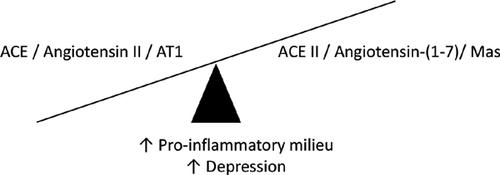Protein & Peptide Letters ( IF 1.6 ) Pub Date : 2020-05-31 , DOI: 10.2174/0929866527666191223144000 Satyajit Mohite 1 , Marsal Sanches 1 , Antonio L Teixeira 1

|
Mood disorders include Major Depressive Disorder (MDD), Bipolar Disorder (BD) and variations of both. Mood disorders has a public health significance with high comorbidity, suicidal mortality and economic burden on the health system. Research related to mood disorders has evolved over the years to relate it with systemic conditions. The Renin Angiotensin System (RAS) has been noticed to play major physiological roles beyond renal and cardiovascular systems. Recent studies have linked RAS not only with neuro-immunological processes, but also with psychiatric conditions like mood and anxiety disorders. In this comprehensive review, we integrated basic and clinical studies showing the associations between RAS and mood disorders. Animal studies on mood disorders models - either depression or mania - were focused on the reversal of behavioral and/or cognitive symptoms through the inhibition of RAS components like the Angiotensin- Converting Enzyme (ACE), Angiotensin II Type 1 receptor (AT1) or Mas receptors. ACE polymorphisms, namely insertion-deletion (I/D), were linked to mood disorders and suicidal behavior. Hypertension was associated with neurocognitive deficits in mood disorders, which reversed with RAS inhibition. Low levels of RAS components (renin activity or aldosterone) and mood symptoms improvement with ACE inhibitors or AT1 blockers were also observed in mood disorders. Overall, this review reiterates the strong and under-researched connection between RAS and mood disorders.
中文翻译:

探索与肾素-血管紧张素系统(RAS)有关的情绪障碍生理病理学证据。
情绪障碍包括重度抑郁症(MDD),双相情感障碍(BD)以及两者的变异。情绪障碍具有严重的公共卫生意义,具有较高的合并症,自杀死亡率和卫生系统的经济负担。多年来,与情绪障碍有关的研究已经发展起来,将其与全身性疾病相关联。肾素血管紧张素系统(RAS)已被发现在肾脏和心血管系统之外起着重要的生理作用。最近的研究已将RAS不仅与神经免疫过程联系在一起,而且还与精神疾病如情绪和焦虑症联系在一起。在这项全面的综述中,我们综合了基础和临床研究,显示RAS与情绪障碍之间的关联。关于情绪障碍模型(抑郁症或躁狂症)的动物研究致力于通过抑制RAS成分(如血管紧张素转化酶(ACE),血管紧张素II 1型受体(AT1)或Mas)来逆转行为和/或认知症状受体。ACE多态性,即插入/缺失(I / D)与情绪障碍和自杀行为有关。高血压与情绪障碍的神经认知缺陷有关,RAS抑制可逆转高血压。在情绪障碍中也观察到低水平的RAS成分(肾素活性或醛固酮)和使用ACE抑制剂或AT1阻滞剂改善情绪症状。总体而言,本评价重申了RAS与情绪障碍之间的紧密联系和研究不足。高血压与情绪障碍的神经认知缺陷有关,RAS抑制可逆转高血压。在情绪障碍中也观察到低水平的RAS成分(肾素活性或醛固酮)和使用ACE抑制剂或AT1阻滞剂改善情绪症状。总体而言,本评价重申了RAS与情绪障碍之间的紧密联系和研究不足。高血压与情绪障碍的神经认知缺陷有关,RAS抑制可逆转高血压。在情绪障碍中也观察到低水平的RAS成分(肾素活性或醛固酮)和使用ACE抑制剂或AT1阻滞剂改善情绪症状。总体而言,本评价重申了RAS与情绪障碍之间的紧密联系和研究不足。


























 京公网安备 11010802027423号
京公网安备 11010802027423号